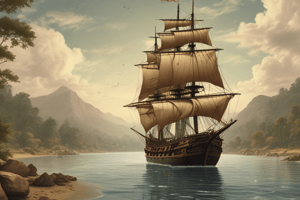Podcast
Questions and Answers
What was the purpose of the Open Door notes issued by Secretary of State John Hay?
What was the purpose of the Open Door notes issued by Secretary of State John Hay?
- To promote American imperialism in Asia
- To support the independence of Cuba
- To establish trade relationships with European nations
- To ensure that China's ports remain open to all nations (correct)
What did the reelection of McKinley suggest about American attitudes towards imperialism?
What did the reelection of McKinley suggest about American attitudes towards imperialism?
- Americans were against imperialism
- Americans were indifferent to imperialism
- Americans were divided on imperialism
- Americans supported imperialism (correct)
Who led the voluntary fighting cavalry unit in Cuba?
Who led the voluntary fighting cavalry unit in Cuba?
- Theodore Roosevelt (correct)
- George Dewey
- General Weyler of Spain
- William Seward
What was the outcome of the Treaty of Paris?
What was the outcome of the Treaty of Paris?
What was the Platt Amendment?
What was the Platt Amendment?
What is a protectorate?
What is a protectorate?
What was the main cause of the Boxer Rebellion?
What was the main cause of the Boxer Rebellion?
What was the role of William Seward?
What was the role of William Seward?
What motivated Americans to support imperialism?
What motivated Americans to support imperialism?
How did the United States acquire Hawaii?
How did the United States acquire Hawaii?
What led to the desire for new markets and raw materials in the United States?
What led to the desire for new markets and raw materials in the United States?
What influenced the United States to engage in military expansion?
What influenced the United States to engage in military expansion?
How did Cuba’s two wars for independence affect American business interests?
How did Cuba’s two wars for independence affect American business interests?
What events led Americans to call for war against Spain?
What events led Americans to call for war against Spain?
What territories did the United States gain from the war with Spain?
What territories did the United States gain from the war with Spain?
Why did some Puerto Ricans resent U.S. control of their government?
Why did some Puerto Ricans resent U.S. control of their government?
Flashcards are hidden until you start studying
Study Notes
American Imperialism
- Three reasons Americans supported imperialism: desire for military strength, desire for new economic markets, and belief in American superiority.
Hawaiian Annexation
- US business leaders took control of Hawaii, and it was annexed in 1898.
Economic Roots of Imperialism
- Industrial overproduction in the US led to the need for raw materials from abroad and new markets for surplus US products.
Military and Political Roots of Imperialism
- Global military expansion of European powers (France, UK) led to US desire to expand its military presence.
Cuba's Wars for Independence
- First war prompted heavy economic investment in Cuba; second war caused concern about American investments.
Events Leading to War with Spain
- Two events led to war: De Lome letter and the sinking of the USS Maine.
Territorial Gains from the War with Spain
- US gained Puerto Rico, Guam, and the Philippines.
Yellow Journalism
- Exaggerated news reporting in newspapers and magazines to make it more exciting.
Territorial Changes after the Spanish-American War
- Cuba gained independence from Spain; Puerto Rico and Guam went from Spanish to American rule; Philippines was sold by Spain to the US and then annexed.
Puerto Rican Resentment
- Resentment towards US control due to loss of political representation, economic exploitation, and limits on personal freedom.
US Protection of Business Interests in Cuba
- Platt Amendment added to Cuban Constitution, limiting Cuba's rights to make treaties with other nations.
Aguinaldo's Betrayal
- Believed the US had betrayed the Filipinos after helping them win independence, and that the US was doing the same thing as Spain.
Open Door Notes
- Issued by John Hay to ensure China's ports remained open and China remained independent.
American Attitudes towards Imperialism
- McKinley's reelection showed that Americans supported imperialism.
Concentration Camps
- General Weyler of Spain was responsible for placing hundreds of thousands of Cubans in barbed-wire concentration camps.
Destruction of the Spanish Fleet
- George Dewey was responsible for destroying the Spanish fleet at Manila.
Imperialism Definition
- Policy of extending a nation's authority over other countries by economic, military, and political means.
William Seward's Importance
- Secretary of State under Lincoln and Johnson, arranged US purchase of Alaska from Russia.
Jose Marti's Importance
- Political activist who worked for Cuban independence, led a rebellion in the second war of independence in 1895.
The Rough Riders
- Voluntary fighting cavalry unit led by Theodore Roosevelt in Cuba.
Treaty of Paris Terms
- Granted Cuba independence, Spain gave Puerto Rico and Guam to the US, and the US paid Spain 20 million for the annexation of the Philippine Islands in 1898.
Platt Amendment
- Provisions in the Cuban constitution that gave the US broad rights in that country.
Protectorate Definition
- A country that is partially controlled by another stronger country.
Open Door Notes
- Letters addressed to the leaders of imperialist nations, proposing that nations share their trading rights with the US.
Boxer Rebellion Causes
- Europeans dominated most of China's large cities, leading to resentment and the formation of secret societies to rid the country of foreign interests.
Studying That Suits You
Use AI to generate personalized quizzes and flashcards to suit your learning preferences.




